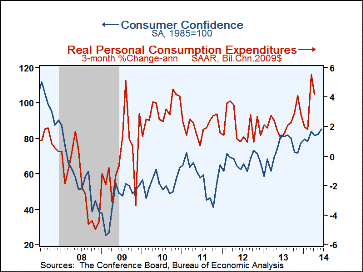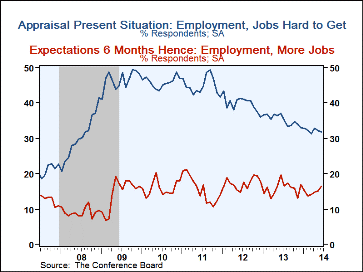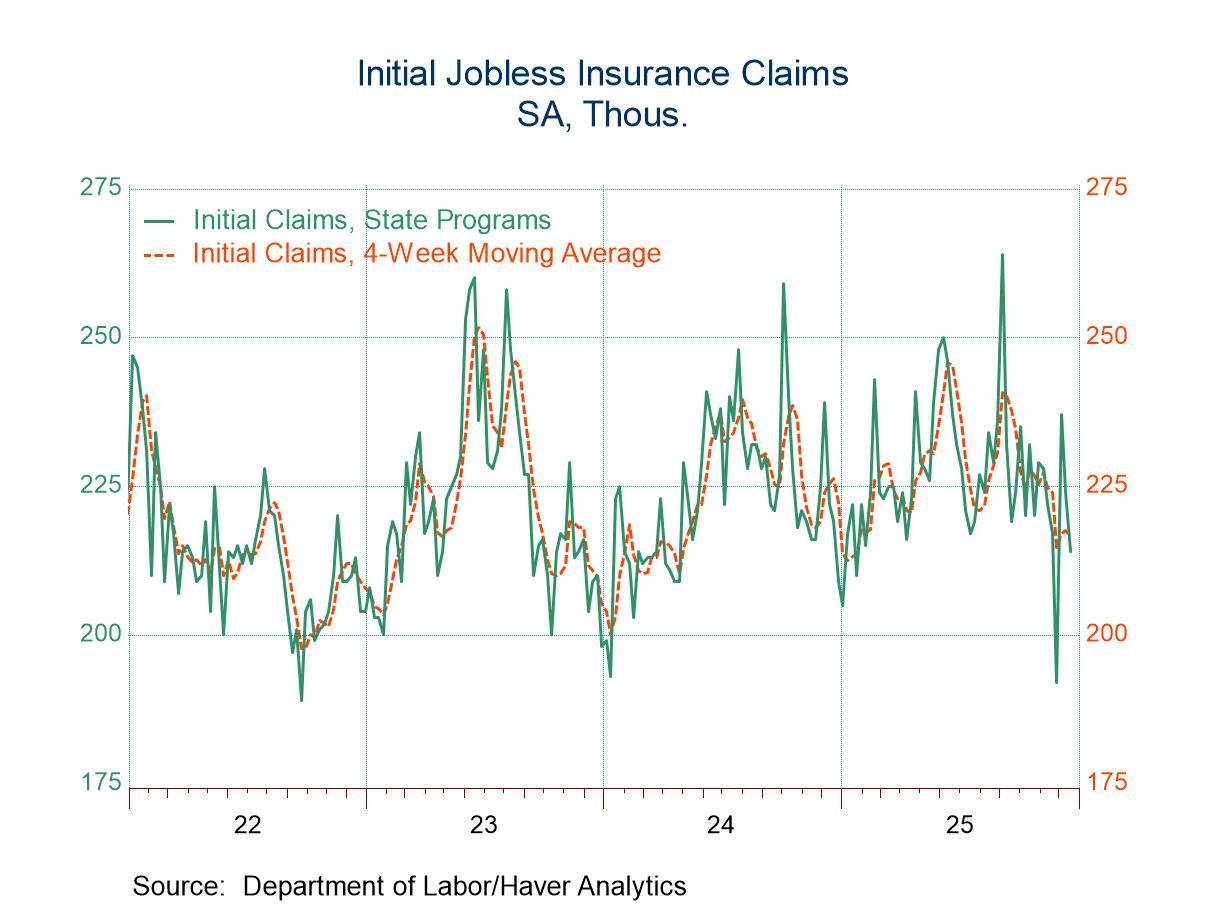 Global| Jun 24 2014
Global| Jun 24 2014U.S. Consumer Confidence Increases Again
by:Tom Moeller
|in:Economy in Brief
Summary
The Conference Board reported that their reading of consumer confidence improved 3.6% (3.8% y/y) to 85.2 this month from 82.2 in May, revised from 83.0. The latest figure was the highest since January 2008 and beat expectations for [...]
The Conference Board reported that their reading of consumer confidence improved 3.6% (3.8% y/y) to 85.2 this month from 82.2 in May, revised from 83.0. The latest figure was the highest since January 2008 and beat expectations for 83.5 in the Action Economics Forecast Survey. During the last ten years, there has been a 45% correlation between the level of confidence and the three-month change in real personal consumption expenditures.
The present situations figure led overall confidence higher with a 6.0% rise (23.9% y/y) to 85.1 from a revised 80.3, initially reported as 80.4. That was accompanied by a 2.0% rebound (-6.5% y/y) in the expectations reading to 85.2. Business conditions were rated as good by a recovery high 23.0% of respondents. Jobs were viewed as hard to get by a slightly lessened 31.8% of respondents, near the expansion low. An improved 16.3% thought there would be more jobs in six months. To the downside, a greatly lessened 0.5% of respondents expected to buy a home in six months, the least since February of last year but an improved 50.2% were going to buy a major appliance. A greatly improved 4.6% of respondents planned to buy a new automobile within the next six months. Expectations for the inflation rate in six months slipped to 5.5%.
By age group, confidence deteriorated moderately amongst individuals under 35 years old. For those aged 35-54 years old, confidence improved to its highest level since September 2007 while confidence amongst individuals aged 55 and over jumped to its highest level since January 2008.
The Consumer Confidence data is available in Haver's CBDB database. The total indexes appear in USECON and the market expectations are in AS1REPNA.
| Conference Board (SA, 1985=100) | Jun | May | Apr | Y/Y % | 2013 | 2012 | 2011 |
|---|---|---|---|---|---|---|---|
| Consumer Confidence Index | 85.2 | 82.2 | 81.7 | 3.8 | 73.2 | 67.1 | 58.1 |
| Present Situation | 85.1 | 80.3 | 78.5 | 23.9 | 67.6 | 49.8 | 36.1 |
| Expectations | 85.2 | 83.5 | 83.9 | -6.5 | 77.0 | 78.6 | 72.8 |
| Consumer Confidence By Age Group | |||||||
| Under 35 Years | 102.3 | 106.4 | 105.0 | 1.2 | 93.1 | 86.5 | 77.3 |
| Aged 35-54 Years | 92.1 | 88.4 | 86.8 | 8.9 | 76.8 | 68.5 | 59.8 |
| Over 55 Years | 73.6 | 67.0 | 68.8 | 4.4 | 61.2 | 56.7 | 47.3 |
Tom Moeller
AuthorMore in Author Profile »Prior to joining Haver Analytics in 2000, Mr. Moeller worked as the Economist at Chancellor Capital Management from 1985 to 1999. There, he developed comprehensive economic forecasts and interpreted economic data for equity and fixed income portfolio managers. Also at Chancellor, Mr. Moeller worked as an equity analyst and was responsible for researching and rating companies in the economically sensitive automobile and housing industries for investment in Chancellor’s equity portfolio. Prior to joining Chancellor, Mr. Moeller was an Economist at Citibank from 1979 to 1984. He also analyzed pricing behavior in the metals industry for the Council on Wage and Price Stability in Washington, D.C. In 1999, Mr. Moeller received the award for most accurate forecast from the Forecasters' Club of New York. From 1990 to 1992 he was President of the New York Association for Business Economists. Mr. Moeller earned an M.B.A. in Finance from Fordham University, where he graduated in 1987. He holds a Bachelor of Arts in Economics from George Washington University.










